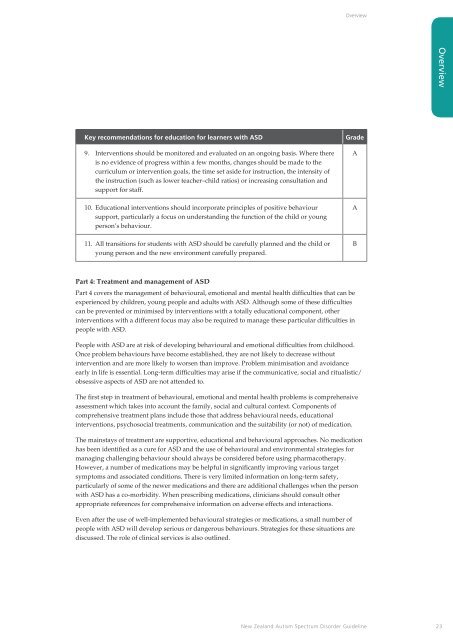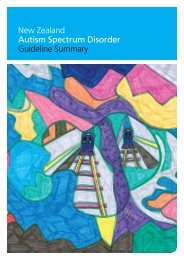New Zealand Autism Spectrum Disorder Guideline - Ministry of Health
New Zealand Autism Spectrum Disorder Guideline - Ministry of Health
New Zealand Autism Spectrum Disorder Guideline - Ministry of Health
Create successful ePaper yourself
Turn your PDF publications into a flip-book with our unique Google optimized e-Paper software.
Overview<br />
Overview<br />
Key recommendations for education for learners with ASD<br />
9. Interventions should be monitored and evaluated on an ongoing basis. Where there<br />
is no evidence <strong>of</strong> progress within a few months, changes should be made to the<br />
curriculum or intervention goals, the time set aside for instruction, the intensity <strong>of</strong><br />
the instruction (such as lower teacher–child ratios) or increasing consultation and<br />
support for staff.<br />
10. Educational interventions should incorporate principles <strong>of</strong> positive behaviour<br />
support, particularly a focus on understanding the function <strong>of</strong> the child or young<br />
person’s behaviour.<br />
11. All transitions for students with ASD should be carefully planned and the child or<br />
young person and the new environment carefully prepared.<br />
Grade<br />
A<br />
A<br />
B<br />
Part 4: Treatment and management <strong>of</strong> ASD<br />
Part 4 covers the management <strong>of</strong> behavioural, emotional and mental health difficulties that can be<br />
experienced by children, young people and adults with ASD. Although some <strong>of</strong> these difficulties<br />
can be prevented or minimised by interventions with a totally educational component, other<br />
interventions with a different focus may also be required to manage these particular difficulties in<br />
people with ASD.<br />
People with ASD are at risk <strong>of</strong> developing behavioural and emotional difficulties from childhood.<br />
Once problem behaviours have become established, they are not likely to decrease without<br />
intervention and are more likely to worsen than improve. Problem minimisation and avoidance<br />
early in life is essential. Long-term difficulties may arise if the communicative, social and ritualistic/<br />
obsessive aspects <strong>of</strong> ASD are not attended to.<br />
The first step in treatment <strong>of</strong> behavioural, emotional and mental health problems is comprehensive<br />
assessment which takes into account the family, social and cultural context. Components <strong>of</strong><br />
comprehensive treatment plans include those that address behavioural needs, educational<br />
interventions, psychosocial treatments, communication and the suitability (or not) <strong>of</strong> medication.<br />
The mainstays <strong>of</strong> treatment are supportive, educational and behavioural approaches. No medication<br />
has been identified as a cure for ASD and the use <strong>of</strong> behavioural and environmental strategies for<br />
managing challenging behaviour should always be considered before using pharmacotherapy.<br />
However, a number <strong>of</strong> medications may be helpful in significantly improving various target<br />
symptoms and associated conditions. There is very limited information on long-term safety,<br />
particularly <strong>of</strong> some <strong>of</strong> the newer medications and there are additional challenges when the person<br />
with ASD has a co-morbidity. When prescribing medications, clinicians should consult other<br />
appropriate references for comprehensive information on adverse effects and interactions.<br />
Even after the use <strong>of</strong> well-implemented behavioural strategies or medications, a small number <strong>of</strong><br />
people with ASD will develop serious or dangerous behaviours. Strategies for these situations are<br />
discussed. The role <strong>of</strong> clinical services is also outlined.<br />
<strong>New</strong> <strong>Zealand</strong> <strong>Autism</strong> <strong>Spectrum</strong> <strong>Disorder</strong> <strong>Guideline</strong> 23











